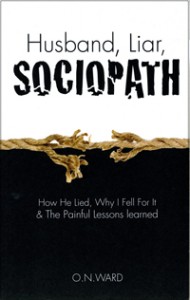Every week, a chapter of my book, “Husband, Liar, Sociopath: How He Lied, Why I Fell For It & The Painful Lessons Learned” (available via Amazon.com, just click on the title or book cover) will be published here on Lovefraud. To read prior chapters, please see the links at the bottom of the post.
Chapter 41: Stronger
Over the next year, with Dr. Davis’s help, I changed, but Paul did not. As my emotional strength and awareness grew, albeit slowly, I started to understand one of Paul’s key manipulation tactics, and I refused to be sucked in.
Paul had a habit of entangling me in things someone else had done to disappoint or upset him. To show support for my chronically busy and overworked husband, he encouraged me to feel that I should take care of these issues for him. Not understanding this dynamic, I often did his dirty work for him, casting myself as demanding and unreasonable to help solve Paul’s problems for him, all the while allowing Paul to maintain his coveted good guy image. Paul enjoyed playing golf, for example, and wanted Jessica and Daniel to learn to play as well. When neither child wanted to learn, Paul expressed to me how disappointed he was in the children. Through subtle and not so subtle cues, he encouraged me to pressure them into taking lessons so they could play with him. (This is the same man who refused to allow our children to play a sport I loved and at which I excelled—squash—because it was too elitist.) As I began to understand this unhealthy dynamic—that I was supposed to demand things that Paul wanted from other people—I refused to be a part of it.
“If you’re disappointed Daniel doesn’t want to play golf or you think a 3.9 grade point average is too low for Jessica, then tell them yourself. I don’t agree, and I won’t deliver your message for you.”
Surprise! Surprise! While Paul continued to pressure me to be his enforcer, if I held fast and refused, he rarely delivered the unpopular message himself.
Realizing that, in my desire to please Paul, I had allowed myself to be overly demanding with my children—who deserved my love, guidance, and support rather than more manipulation—I was consumed with guilt. I wanted a cosmic do-over, but I would not get one. Staying mired in a brackish bog of regret would only tie me to the past and make change even harder though, so I fought against the resulting self-loathing, apologized profusely to my children for not being the mother they deserved, and started to eke out a modicum of forgiveness for myself.
This was only the tip of the iceberg though. The patient, kind, loving mother I had been initially remained elusive. Sure, I was compassionate, supportive, and helpful most of the time, but I still snapped at Jessica and Daniel and continued to nag them, especially when reasonable request after reasonable request (e.g., “please put your dishes in the dishwasher” or “we need to be on time for your dentist appointment”) fell on deaf ears. Some of my bad parenting was part of the human condition; none of us are perfect, but I have to own much of it. The fact that I was emotionally frayed and fatigued due to incessant emotional and psychological erosion by Paul, which consistently slipped under the defenses of my conscious mind, explains how I morphed from such a great mom into being verbally harsh with my children far too often. Still, the behavior and the responsibility was mine. It is one of my deepest regrets.
Just as one of the Joker’s goals in the Batman movie, The Dark Knight, was to make the embodiment of goodness and justice, District Attorney Harvey Dent, embrace evil and injustice, it was as if Paul delighted in seeing his formerly sweet, nice, empathetic wife turn angry and impatient with her children. Moments when I was not the mother my children deserved added to the backdrop of feeling awful. Only looking back now do I understand that some of the dynamics with Jessica and Daniel resulted not only from my flawed parenting but also from them modeling the behavior of the person in power—Paul—and the role in which I had allowed myself to be cast—doormat. Why should they listen to me? Why should they respect me? Jessica and Daniel were absorbing what they witnessed—their father constantly undermining me, the subtle and not so subtle communication that all my requests and opinions were stupid or unreasonable and to be dismissed with thinly veiled and always denied contempt. Brush their teeth? Are you kidding? Put on suntan lotion? Mom, you are sooooo controlling. Be ready to leave on time? Dad’s always late. Sit down to eat for dinner? But Dad’s watching TV. Honor your commitments? Dad always cancels at the last minute. It was endless.
The mountain I had chosen to climb—that of my own emotional recovery in the context of an emotionally and psychologically abusive relationship that I recognized as complicated and imperfect but not as “abusive”—was steep and high. Not only did I not have a cheerleader, I had the opposite—“crazy making,” deceitful unraveling of any attempt to regain emotional strength. Still, day-by-day and week-by-week, I elevated myself in my mind as someone who deserved happiness and had independent needs that deserved to be met. After a year of weekly sessions with Dr. Davis, I felt ready to lay the foundation for a different future. I needed a life that was not defined totally by being Paul’s wife and Jessica and Daniel’s mother.
I started looking into possible future career scenarios, such as getting the necessary credentials to teach at a private school or getting my resume together to work at a public relations and advertising company in the area. Not surprisingly, in private or at home, Paul was less than enthusiastic about my moves toward strength and independence.
“Why are you even bothering? I make more than enough money. You’ll never get a teaching position; it’s too competitive. And besides, the pay’s horrible. Why are you volunteering at the local arts council? You’ll never be appreciated.”
A metaphor broke into my conscious mind. Life with Paul was like an ongoing game of “Whack-A-Mole.” I had become accustomed to living in the darkness. On those rare occasions when I needed to come up for air, Paul was waiting to whack me back down into my hole before I could feel the sun on my skin or fill my lungs with fresh air. This is a technique many controlling, abusive men use to keep their partners so eroded that it is all but impossible for them to escape the abuser’s control. Paul wielded the technique with skill, constantly making me attribute my negative feelings to a character flaw of mine, such as being too sensitive, competitive, controlling, or impatient, because he was just being honest and respectfully realistic.
Keeping me off-balance and depleted was key, for if I regained my life, I would be less dependent on Paul. His power over me would wane, and I might have less time to be the stagehand for his show. I might even attempt to leave, and for him that would be both inconvenient and expensive.
This time, however, I would not allow Paul’s putdowns and lack of support to derail me. They were all the more reason to get back into a world that, prior to Paul, had been a source of happiness, positive feedback, and purpose. It was time to do something nice for myself, something I had not done for ten years—get a new car. My old reliable minivan had more than 110,000 miles on it and had outlived its role in our family. I wanted something smaller, more reliable, and with better gas mileage—a small Toyota. Paul tried to talk me out of it. He wanted me to want a BMW.
We test-drove a Toyota. Paul did not like it. He convinced me to go with him to the BMW dealership, to stay open-minded. That was the car Paul wanted me to get. He was unrelenting, selling me on how incredibly reliable it was, how maintenance-free it would be, how much safer. The list went on and on. Even if I did not care about buying such an expensive car, I did care about reliability, because I was in the car with the kids constantly. I had checked out the literature. The BMW was not among the top picks on the criteria I valued, and the Toyota was. I wanted the Toyota. With my heart pounding, my voice tight, and both Paul and the BMW salesperson trying to convince me that they knew best what car I wanted to drive for the next ten years, I stood my ground and did not buy the BMW. Paul was incredulous.
It was the first time in years I had known what I wanted, had gone about the decision the way I wanted, and had not let Paul convince me of what I should want. Knowing that I had not caved in to what Paul told me I should do was satisfying.
Yet, pride in myself soon gave way to another feeling—an unsettling mixture of anger and confusion. Why should I be so proud of myself for fighting to have my needs met? If I was going to use the car 99.9 percent of the time, why was I being pressured to buy a vehicle that fell short of meeting my needs? Why was I even arguing with Paul that maintenance record, reliability, and gas mileage were more important to me than styling and status? This was absurd. Why did I have to explain to Paul that my needs and values were legitimate? It was as if I believed that if I just illuminated my perspective more thoroughly or in a somewhat different way, he would understand and support me.
The absurdity of the situation penetrated me. Paul pressuring me to get the car he wanted was really no different than Paul trying to convince me that my favorite color was red when it is, and always has been, blue. It was crazy! Why didn’t I get to have a favorite color? Why didn’t my needs count as valid? If you love someone, shouldn’t you want what’s best for him or her? Shouldn’t you want to help the person you love have his or her needs and goals met? Not if you are a sociopath! Any need of mine multiplied by my value to Paul (zero) was and always would be zero. Paul had married me to fulfill his needs—period. There was no quid pro quo. To him, my needs were an inconvenience to be molded, extinguished, or adapted to his own ends.
Over years of Paul delegitimizing my needs, perceptions, and values, I hardly knew who I was, what I valued, or what I wanted. This made it easier for Paul to manipulate me. How could I possibly make a meaningful decision when my identity was all but gone? As one of my all-time favorite books, How We Decide, highlights, decisions are based on emotions. Emotions derive from a combination of who we were when we were born (we are all hard-wired a bit differently), past experiences, current situations, and how we think. There is no right or wrong emotion, because we are all individuals. For some, playing golf will make them feel good and become their life’s passion, while others will feel bored and frustrated by the game and have no interest. Some will spark to the excitement of city life, others to the tranquility of the mountains. There is no right or wrong to such decisions, just what feels right to each of us.
But what if you have lost a sense of who you are and what you value? How do you make decisions when what you care about and value has been trampled and you are functioning on life support? Once Paul had damaged my internal gyroscope, decision-making became virtually impossible. As a result, I would defer decisions to Paul, because he always seemed to have a stronger, almost instantly formed opinion or valued something more highly than I did. By design, Paul created a void where a strong person had once stood, and then he filled the void exclusively with his needs, values, and priorities. He decided where we would vacation and with whom we would share our vacations. He decided that much of our furniture was too old and that we should redo our once warm and inviting house with a new man-cave decor filled with black, brown, and tan as well as lots of leather and faux fur. (Yuck!) He decided that we could never visit my family for Thanksgiving. No wonder Paul expected to dictate what car I should buy. When I did not agree to buy the BMW, Paul must have detected a significant shift in me. Action was required.
It started with mind games, couched in a loving, “I only want what’s best for you” and “you deserve to have nice things” tone. Then, when I did not make the instant decision Paul wanted me to make, he indicated that I took too long to make decisions, overthought everything, didn’t know what I really wanted, and didn’t know what I should want. Wouldn’t it be easier to just get the car Paul was so confident would be right for me? Shouldn’t the speed of his decision-making and the voracity of his conviction be evidence of the rightness of his conclusion, compared to the lumbering quality of my decision-making?
But my labored, deliberate way of making the decision about my new car was not the problem. The problem was that I had regained some of my former self and strength. Paul wanted me to want what he wanted me to want, but for the first time in a long, long time, I wanted what I wanted, and I knew what that was—a Toyota. I was not going to be convinced otherwise.
Start from the beginning:
Go to previous chapter:
Go to the next chapter:
Notes
Identifying names, places, events, characteristics, etc. that I discuss here and in my book have been altered to protect the identity of everyone involved.





































 Psychopaths are naturally skilled at spotting potential victims
Psychopaths are naturally skilled at spotting potential victims